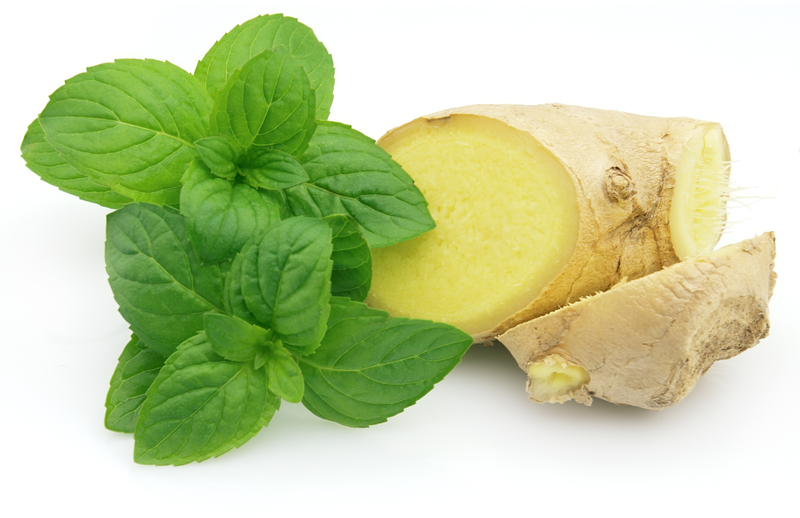13 Natural Remedies for Stomach Ache & Discomfort

Everyone has experienced tummy troubles at one time or another. In fact, one of the most common reasons people set an appointment to visit their doctors is to help ease a stomach ache. There are definitely times when this is the most appropriate action to take: after all, it could be the symptom of something serious. Yet much of the time, you may be able to get the relief you need with natural remedies for stomach aches.
There are numerous reasons why our stomachs may ache—from a car, boat, or train ride to gas or indigestion to acid reflux to a mild infection or stomach bug or even a pulled muscle. Sure, you could ride it out and wait for it to resolve in a few hours to a few days, but if you have non-urgent symptoms, such as feeling mild to moderate discomfort, bloating, nausea, or mild bowel changes, natural remedies for stomach ache may be able to provide fast relief—or prevent them from occurring in the first place. You may even already have the remedy in your own kitchen.
Top Natural Remedies for Stomach Ache
1. Ginger
Ginger is one of the most highly recommended natural remedies for stomach aches, nausea, motion sickness, and more. Not only has it been recommended since ancient times, but it’s also got research behind it, showing it may be beneficial for many types of stomach issues, including:
- Nausea and vomiting from motion sickness
- Morning sickness
- Side effects of chemotherapy. 1
What’s more, ginger is loaded with antioxidants and appears to have anti-inflammatory properties, which may help reduce stomach acid, which can lead to nausea or indigestion.
There are ginger chews, candies, ales, and even supplements available. But one of the simplest, least expensive options is to make a stomach-soothing ginger tea by slicing a two-inch chunk of fresh ginger and steeping it in hot water.
2. Applesauce
Because apples are around 85% water, applesauce may help promote hydration. It also contains pectin, a type of fiber shown to help ease diarrhea. 2 Just choose homemade applesauce or one made without added sugar and other additives that may be hard for your stomach to digest.
Why not just eat an apple? Because applesauce, which is made with cooked apples, is easier to digest. And foods that are easily digested are gentler on the gastrointestinal tract. 3
3. Prunes
Prunes (i.e., dried plums) are another food high in fiber that may help relieve stomach aches, especially when associated with constipation and other digestive disorders. 4 Kiwifruit is another food that’s been found to be similarly beneficial. 5
4. Probiotic-Rich Foods and Supplements
Probiotic-Rich Foods and Supplements are worth considering for people who feel discomfort from bloating, poor digestion, or traveler’s diarrhea, as they help repopulate the gut with healthy live cultures that may soothe the digestive system. 7 Yogurt and kefir are obvious examples, but don’t forget other probiotic-rich foods like sauerkraut, pickles, kimchi, and apple cider vinegar. 8
5. Bananas
Bananas are another food with a long history of helping ease stomach upset. It is rich in magnesium and potassium, two minerals that may help relax spasms and cramps in the digestive system. It’s also well-known for helping curb diarrhea, especially if it’s on the greener side. Riper bananas may have the opposite effect to help ease constipation. 6 Even half of a banana may help get you on your way back to feeling better.
6. Chamomile
Chamomile is another herb with anti-inflammatory properties. It may help ease muscles within the GI tract that get tight when the stomach is upset. Consuming it warm (e.g., as tea) can further help ease stomach cramping. 9
7. Peppermint
Peppermint is another great tea option. It contains menthol and methyl salicylate, both of which may help calm your stomach and reduce cramping and nausea. It can also help stimulate the movement of digestive fluids (e.g., bile), which can help the body break down foods more quickly. Peppermint tea is also a natural remedy recommended for many of the more intense stomach issues, like IBS, flu, or food allergies. 10
8. Soda with Bitters
Ever thought of heading to the bar for tummy troubles? Probably not. (A previous visit may even be why you have a stomach ache.) Look past the boozy options and instead reach for chilled tonic water or club soda with a dash of bitters. The bubbly water may help improve digestion by improving your ability to swallow, increasing satiation after meals, and relieving constipation. 11 – 13 Bitters are often made with cinnamon, fennel, mint, ginger, or other herbs, which may help ease nausea.
While club soda is naturally low in calories, look for light tonic water, such as Q Mixers Light Tonic Water, to limit unnecessary sugars and calories. If you don’t have any bitters on hand, you can always add some sliced ginger, lime, or other herbs to your preferred sparkling water for some relief.
BREAKING: Forget Taking Collagen, Try This 21-Second Trick for Healthier Skin & Hair Instead
9. White Toast
White toast may not be on your healthy food menu, but if you have stomach issues, it may be one of the few foods you can actually stomach. 14 Moreover, it has been shown that because it’s bland and easy to digest, lightly toasted white bread can help settle the upset. 3 If plain toast is a bit too dry, add a light smear of a bland topping like nut butter.
Another similar option is white-flour (i.e., low-fiber) crackers. Saltines are often suggested as the added salt may help replenish the lost sodium due to sweating, diarrhea, or vomiting.
10. Intermittent Fasting
Sometimes, it’s less about what you eat and more about what (or when) you don’t. For example, intermittent fasting can give your digestive tract some much-needed time to rest, repair, and recover. It may give food time to digest and move through the system, easing bloating. Fasting may also help reset the gut microbiome. 16
If you’re new to intermittent fasting, it can help to ease into it by starting with a shorter fast (such as by eating dinner earlier or delaying breakfast a couple of hours). Even a few days of a 16:8 cycle (fast for 16 hours and eat for 8 hours, for example) may help your body get back to normal.
Whether you’re fasting or not, you can also help reduce stomach discomfort by avoiding fatty or greasy foods, acidic foods, fruit juices, and spicy foods until your digestive system returns to normal.
11. Rice
Rice is another food that’s well-known for its beneficial effect on stomach upset. Rice is bland, but it also adds bulk and can absorb excess fluids, which can help decrease diarrhea. Adding half a serving to your next meal may help ease symptoms. 15
12. Yoga
Yoga may also help ease your symptoms. Some poses, for instance, can help move trapped gas to help relieve bloating and constipation. It may even stimulate the gut. Some recommended poses include fish pose, spinal twists, and the aptly named wind-relieving pose. Exercise in general—yoga and otherwise—may also help both prevent and ease digestive system woes. But if you’re already feeling a bit queasy or bloated, yoga is one of the gentlest options.
13. Heating Pads
Heating pads and hot water bottles may not be your first thought for a natural remedy for stomach aches, but especially if you’re suffering from muscle, PMS, or IBS cramping, the heat may help relax and loosen the muscles to help ease the discomfort. 17 If you can’t find (or don’t have) a heating pad, an alternative is to take a hot shower or bath.
While you may be able to resolve mild to moderate stomach pain with natural remedies, stomach aches can also be a sign of something serious, including:
- Appendicitis
- Heart attack
- Intestinal obstruction
- Diabetic ketoacidosis
- Diverticulosis
- Ectopic pregnancy
- Endometriosis
- Kidney infection or stones
- Gallstones
- Pancreatitis
- Pneumonia
- Urinary tract infection (UTI)
- Angina
- Celiac disease
- GERD
- Hernia
- Irritable bowel syndrome
- Crohn’s disease
- And more
So, if your stomach ache is combined with other symptoms like a high fever, severe pain and abdominal tenderness, rapid pulse, high or low blood pressure, shortness of breath, severe nausea and vomiting (or if they last for more than a day or two), blood in the stool, or signs of dehydration, it’s time to immediately seek medical care. And if you have tried the above natural remedies and aren’t finding relief after a day or two, make an appointment with your healthcare team to help you discover the problem, rule out anything serious, and find the right solution for you.





 7 Signs Your Body is Seriously Low on Collagen (not just wrinkles)
7 Signs Your Body is Seriously Low on Collagen (not just wrinkles) Health Expert: "Turmeric Doesn't Work (unless...)"
Health Expert: "Turmeric Doesn't Work (unless...)" 3 Warning Signs Your Probiotic Supplement is a Total Waste
3 Warning Signs Your Probiotic Supplement is a Total Waste

